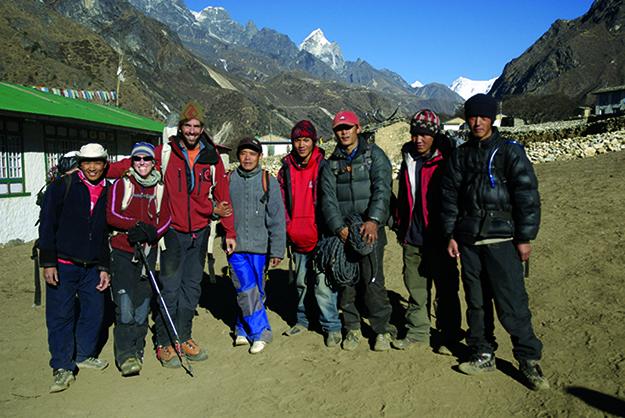Khumbu Climbing School
During the spring of 2002, Jennifer Lowe Anker and her husband Conrad Anker were hiking to the Everest base camp. It was part honeymoon, part pilgrimage and just a few years after her late husband, Alex Lowe, had died on Shishapangma. On their way, they passed through the small Nepalese village of Dugla. Here they wound through roughly a hundred chortens—small handmade pyramids of rock built in memory of the many people who have died on Everest. “We came upon a beautiful little chorten for Alex,” Jenni told me, “It said ‘Alex Lowe Friend.’ Conrad and I were both very touched by this experience.” Jenni remembered Alex telling her how much he had loved the sherpas but how inexperienced they were climbing—many didn’t know how to tie a basic climbing knot. She eventually found out that of all those who had died on Everest, two-thirds were sherpas.
It is the sherpa who often goes first on the icefall, it is the sherpa who climbs without formal or technical training, and it is the sherpa who suffers to help others reach their summiting dreams.
From this, an idea began to form. Now, thanks to the Alex Lowe Charitable Foundation founded by Jenni Lowe Anker, the Khumbu Climbing School celebrated its fourth year this past winter in Phortse, Nepal.
Phortse welcomed 56 Nepali men and women to the icefalls in 2007. Over the course of eleven days, they participated in various hands-on classes taught by world-class climbers. Each year the group divides into beginner, intermediate, and advanced sections. The program builds on itself as advanced and graduated students return to help teach the fine art of technical climbing, including equipment inspection, knots, belaying, rope management, protection, and risk avoidance. The long-term goal of the foundation is to turn over much of the teaching to the experienced graduates.
The town of Phortse has so embraced this endeavor that it offered a plot of land for the construction of a more permanent future structure.
“For the sherpas, climbing is a vocation, not a sport,” Jenni notes, “This dangerous work is one of the best-paying jobs in Nepal. To help them become safer on the mountain, they need the technical, leadership, and communication skills that we teach them at the school.” Over the last few years, the Khumbu Climbing School has added English classes (English is the universal language used at base camp). This year Dr. Luanne Freer, director of the nonprofit Everest Base Camp Clinic and fellow Bozemanite, taught a wilderness medical class and helped Phillip Henderson of National Outdoor Leadership School (NOLS) teach a leadership seminar. A business-skills discussion became part of the curriculum because many sherpas are interested in starting their own guiding companies on Everest.
All graduating students receive a diploma, and this year two stellar sherpas were awarded scholarships to attend a NOLS leadership seminar in the United States.
“I wasn’t really involved in philanthropy before Alex’s death,” Jenni says, adding, “Gregg Mortenson [cofounder of Bozeman-based Central Asia Institute and author of Three Cups of Tea] encouraged me to start a foundation in Alex’s name as a way to keep his memory alive. It was a huge way for me to work through the grief and was very beneficial for me to find something positive in Alex’s death. There has been a tremendous outpouring of support from the Bozeman and outdoor community. In this world where there is so much misunderstanding between people it’s very rewarding to bring the efforts of so many people and diverse cultures together to do something good.”
To learn more about the school, visit alexlowe.org.






